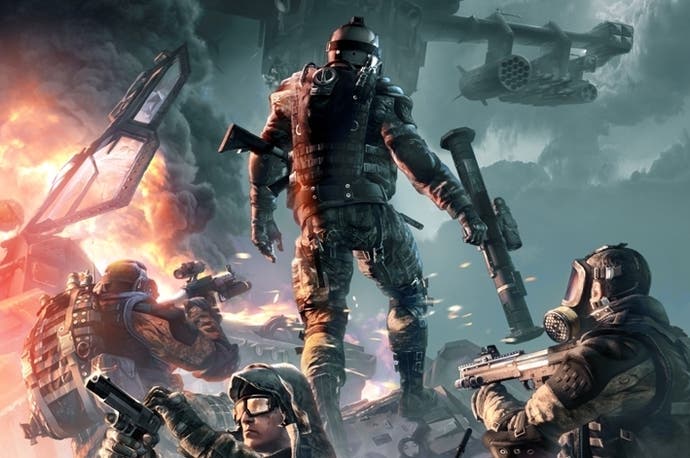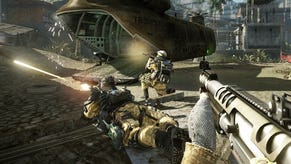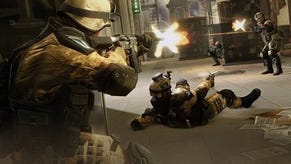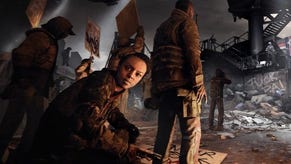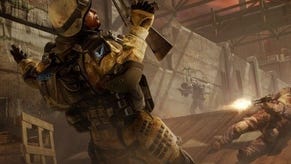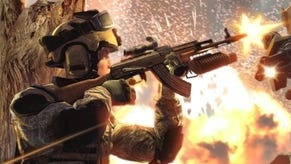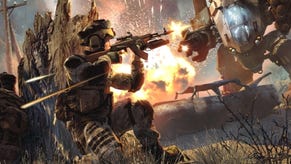Oh! What a lovely Warface
Crytek's free-to-play shooter has a silly name, but deadly serious ambitions.
"Warface is, as the name says, about war and social. Hence the name War... face." Cevat Yerli almost keeps a straight face - almost. By now, the Turkish-German Crytek boss is aware that something's been lost in translation. The title of his company's new free to-play-shooter has raised a few smirks and eyebrows. Americans hate it. Brits think it's funny. But you can't say it's not memorable - and if you believe Yerli's etymology, it's a statement of intent.
Warface is a fun, lightweight, fast-paced online shooter with a faintly OTT modern military theme. It's technically slick and attractive, as you'd expect from Crytek. It's effectively a freebie Call of Duty that plays in your browser. There really isn't a great deal more to it than that: this is functional and effective game design that's as blunt as its name.
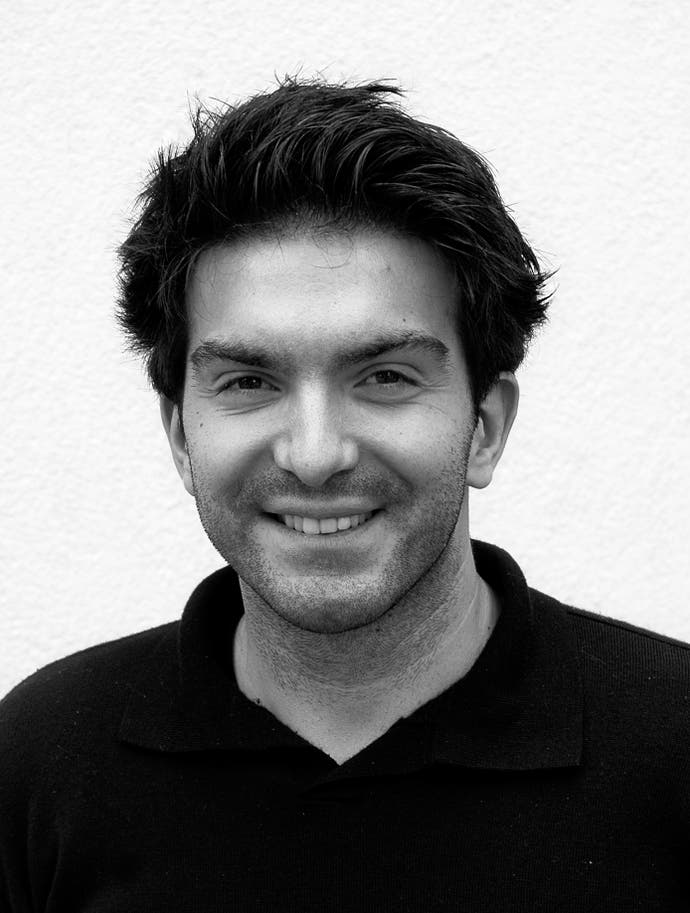
Only there is more going on here. More even than the tale of the triple-A developer with a taste for creating "maximum game" technical showcases suddenly deciding that it's time to make a bid for the other end of the market. That's because Warface is built on Gface, an ambitious social entertainment platform that Yerli seems enthused to present to us at Crytek's Frankfurt offices. It's his baby, we're told - the Crytek project that this tall, outspoken entrepreneur is most excited about. And it's quite a departure for a company that has previously put graphics engineering before absolutely everything else.
"In 2007, I flew to Korea. I was blown away, it was like a different planet for me at that time," Yerli explains. "I was observing the internet café culture... A flock of people came in and sat together and they played together, multiple games one after the other. They zapped through the games. Zapping through the games was possible in Korea at that time because, first, the games were free. Second, they decided together what to play next."
This was Yerli's eureka moment. He loved it, particularly the focus on a cohesive group of friends and the democratic freedom with which players would switch between games. He knew that internet cafés were a local phenomenon which wouldn't take off globally, so he decided to set Crytek's engineers to the task of replicating this social dynamic online.
The result, Gface, is a social network that is entirely geared around playing games with friends. It's a combination of chatroom and Xbox Live party that allows you to launch supported games direct from the browser, and it's persistent the whole time; when you're in Warface's menus, for example, the game window shrinks automatically to reveal your party chat on the left as you debate tactics and loadouts, or talk about switching to another game. You can add games to a shared "table" and launch them very quickly, and since all games will be free-to-play and constantly updated, there are no worries about your friends not having the same game or same version. Playing around with the closed beta at home, I discover that there's a longish installation the first time I play Warface - 40 minutes or so - but after that, it launches in under a minute.
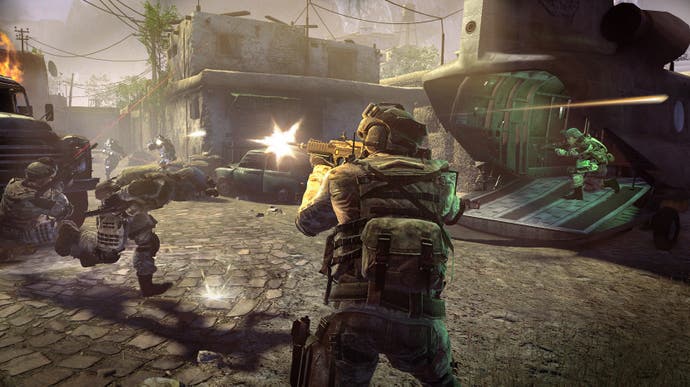
Crytek's strategy is to target gamers first with the likes of Warface, and then expand Gface's repertoire to casual gaming and perhaps even other forms of shared entertainment, like music and video. It's when Yerli says this - plotting a course that takes Crytek from somewhere just outside its comfort zone to a galaxy far, far away - that I realise quite how big his ambitions are.
Those ambitions rest partly in the hands of Joshua Howard, Warface's executive producer: a small, animated, middle-aged American with bright eyes and a thick shock of gunmetal hair. He's a veteran producer with an extraordinary rollercoaster of a resumé. He's headed up big teams and small, inside giant corporations like Microsoft and outside them. One of his proudest achievements is creating and launching Xbox Live Arcade with a small gang of developers, battling the headwinds of internal opposition all the way. It's now counted as one of the most successful and forward-thinking elements of Microsoft's console venture. But he's also tasted disappointment, working at Dundee's now-defunct Realtime Worlds on the infamous APB for a spell ("I got it out the door," he says) and more recently back at Microsoft on the failed free-to-play relaunch of its flight simulator series.

One thing characterises it all, though; he hasn't been interested in traditional methods of game delivery for quite some time. Digital distribution, online gaming, communities, free-to-play: these are his fascinations, and it was Crytek's newfound interest in this area that persuaded him to move his family to Germany's financial capital.
"I've always thought of myself as doing games for humans. Not necessarily gamers," Howard says. "I've not got anything against gamers, but I've loved the idea that bringing this kind of entertainment to really massive audiences is the challenge. Free-to-play... removes one of the reasons why vast amounts of people don't experience the joy of computer gaming."
As an initiative, though, Gface clearly has aims beyond increasing the reach of Crytek's own games. It strikes me that the service is built around the idea of quick switching between multiple games - more games than Crytek could hope to develop itself. I imagine Yerli looking with envy at the trajectory of Valve, a fellow game developer turned engine provider and now, with Steam, an established and vastly successful platform holder in its own right. Crytek's always been a hungry company that played the angles. Is Gface intended to be a socially focused Steam for the free-to-play generation? Will Crytek open it up to third parties?
Howard confirms it - cautiously. "Eventually, we see it as an experience that many different types of games and developers could take advantage of. But having some experience in developing platforms, we want to make sure that we're going about this appropriately. I'm not ready to deliver a platform for an open ecosystem unless it meets certain expectations... As an internal team I am in large part helping the Gface team understand what those expectations are. Eventually? Yes. Details? Too soon to tell."
He's also pretty open about the scale of ambition that drew him to the bullish German company. In the baldest terms, Crytek has foreseen a future where it doesn't need publishers any more, and it wants to hustle that future along. "The very classic model of, we're all developers who do nothing but focus on delivering an end good, that then a publisher packages and moves on through the channel... we've had the luxury of realising that that's not the only answer. The idea that we can take [Crytek's] vision to the next level on our own, that's very exciting. Any developer has to admit that that's a very promising idea. The closer we get to this games-as-a-service world, the closer we get to being much more in the driver's seat." He adds, with understatement: "Crytek's ambition is quite large."
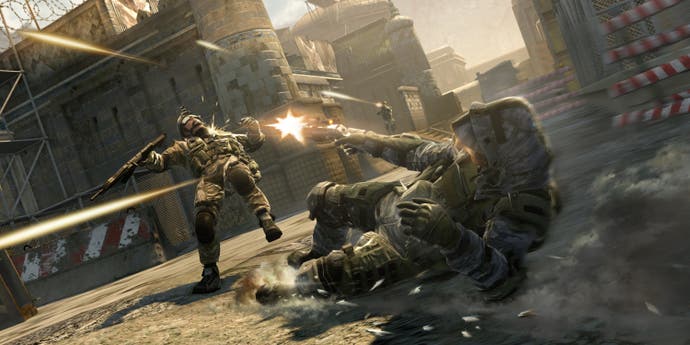
It can't quite achieve it on its own yet, though. For Warface, Crytek has selected co-publishing partners for each major market. Mail.ru in Russia, where the game is already a hit, having gathered 7 million registrations since going live in April of last year. Established online game operators Tencent and Nexon in China and South Korea respectively. And Trion, publisher of the MMOs Rift and the forthcoming Defiance, in the US and Europe, where the game and platform are currently still in closed beta. Howard lists Trion's backend know-how as one of the things it brings to the deal, along with an online gaming platform that will help Crytek process the "huge amounts of data" on player behaviour generated by Warface (and steer players towards "participating in commerce", naturally).
So: Gface is a power play. It's an interesting move, an attempt to bridge twin worlds of free-to-play gaming: the shallow social whirl of Facebook and the deep, hermetically sealed communities of PC games like League of Legends. Yerli pictures it primarily supporting short-session play on lunch breaks and the like. But it needs more games to work and it needs more players to get games. Up trundles Warface, the armoured transport designed to smash through this catch-22.
In many ways, it's a perfect vehicle. It looks and plays exactly as you'd expect any modern multiplayer FPS to. It doesn't have any grand ambitions beyond technical polish and tight gameplay, and it achieves both. It looks contemporary, if not spectacular, and the guns are well tuned for accuracy, feedback, recoil, power. You feel like you've got a strong physical presence in the world thanks to some simple traversal moves and co-op manoeuvres. And it moves like the proverbial off a greased shovel - definitely a game for the twitchy COD generation.
Importantly, it has a substantial co-op component with daily missions to make it more accessible to the deathmatch-fearing crowd. But neither is it pussyfooting around. Co-op missions are tough and at higher levels will require both gearing up and skilled co-ordination, like an MMO raid. And some of the competitive game types are hilariously brutal, especially the 'Plant the Bomb' mode that offers players no respawns within rounds. Teams will need tight tactics and a balanced spread of the four classes - rifleman, engineer, medic and sniper - to succeed.
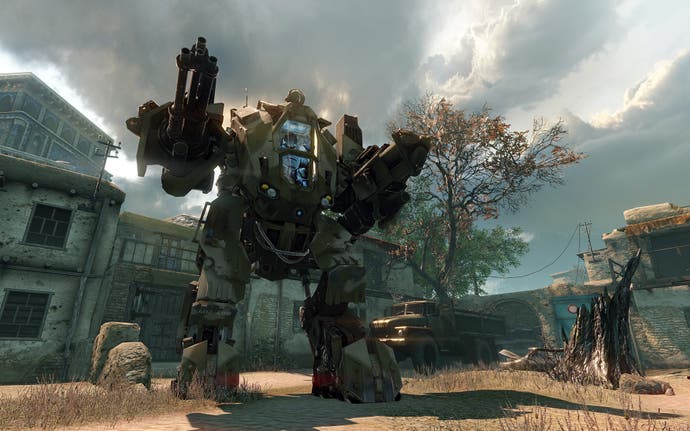
The final and most delicate cog in this smooth-running machine is the micro-transaction design. Here - as everywhere in Warface, to be frank - Crytek has played it pretty safe. The most controversial items, available only for real-world cash, are likely to be the resurrection coins that give you an instant battlefield respawn. Otherwise, you get the usual boosters that increase the rate you earn experience and in-game cash and a few utility items such as grenades, only available in lucky-dip boxes. Guns and armour are bought (or rented) only using in-game currencies and there's no exchange rate - so you can't buy materiel outright with cash, you just hasten the rate that it becomes available to you.
It's still a controversial area - just look at the reception given to EA's current "sell everything, all the time" policy - but Howard seems to have his head screwed on with respect to how to implement new business models. "We've really got to fundamentally think about how we deliver ongoing value, even if it's in small increments - because people pay for value, not for the perception that you're taking something away that they should have had already," he says. "It's easy, as someone in the industry, to get caught up on clever and lose sight of the fact that really, at the end of the day, is it offering value to the player? If it doesn't meet a need and the users don't go for it, then why bother?
"They didn't buy that digital representation of a gun and they didn't buy that cool cloak. What they bought was something that had value to them. And as simple as it is to say that, I think in the expansiveness of free-to-play, some people have lost sight of that. You've got to make me feel like that thing has value, and you've got to create a context where that value feels real to me. That's part art, part science... it's 'I know it when I see it.'"
As a whole, it's fair to say that Warface comes across as more science than art. That crazy title aside, it's a relentlessly rational product, just as you'd expect from the technocrats at Crytek - and indeed, from Frankfurt, a rather clinical metropolis where the airless boulevards are patrolled by silent black limousines. This place doesn't do art. It does money and machines, and machines for making money. Machines like Warface.
It only remains to see how efficient a money-making machine it will be. What it lacks in charisma and originality it makes up for in careful placement; there's definitely room for a classic FPS to muscle in alongside the likes of Dota and World of Tanks in the free-to-play market, something more esoteric games like Team Fortress 2 and Tribes haven't quite managed. But as a vehicle for Gface, there's a lot more riding on Warface besides. Yerli may permit himself a chuckle at that title, but make no mistake, Crytek has its game face on.
This article is based on a trip to Crytek's offices in Frankfurt. Trion and Crytek paid for our travel and accommodation.
